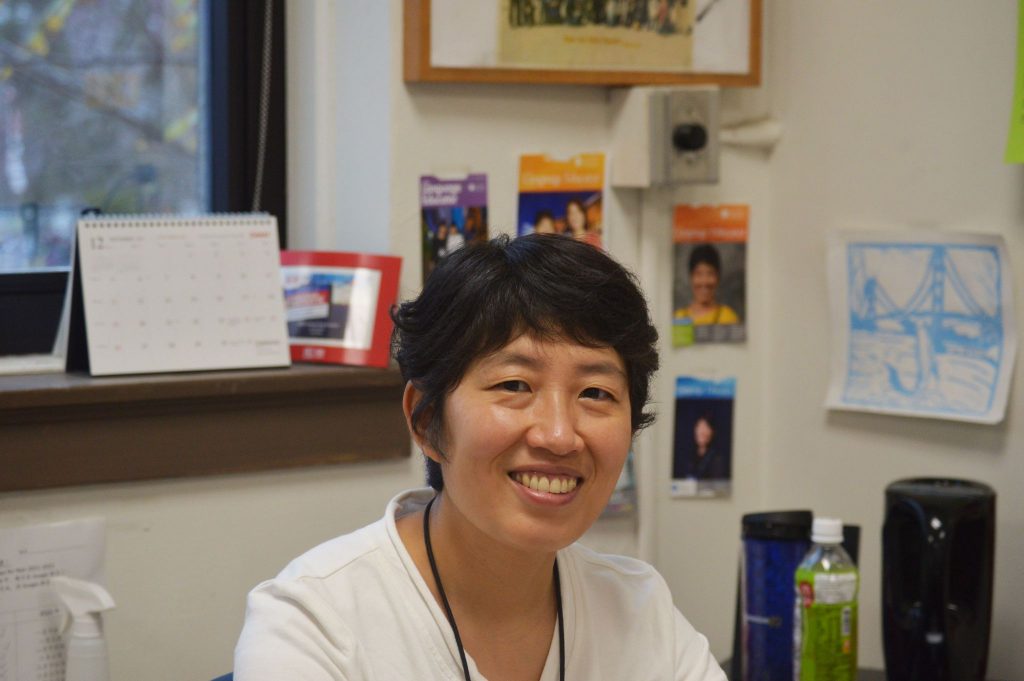Every day at Berkeley High School (BHS), 116 students circulate in and out of C220, the only classroom on campus that offers Mandarin Chinese. BHS’ Mandarin program covers Mandarin I through III and Advanced Placement (AP)/International Baccalaureate (IB) Mandarin. Unlike the other language programs at BHS, every Mandarin student will be taught by a sole teacher: Xin Chen.
Chen has taught Mandarin Chinese for the full 16 years she has been on campus. She was teaching at a weekend Chinese school when a BHS student convinced her to try her hand at teaching at a high school. When Chen came to BHS, she restarted the program and has been the only teacher to instruct it since.
Before moving to the United States from Tianjin, Chen was uninterested in the job of teaching: it seemed too difficult to have to juggle multiple students. However, after attaining her bachelor’s degree and becoming a language teacher, she came to appreciate the fulfilling feeling of teaching her first language.
“To see my students everyday … and to have this relationship with them is a very rewarding experience to me,” Chen said. “That’s how I feel I can [own my] values.”
Restarting the program meant Chen had to start from teaching Mandarin I classes and work her way up the levels each year as the last year’s students advanced. She filled the rest of her teaching schedule with math classes. Now, Chen works with every student in the program and can observe how their learning develops over time.
Chen enjoys the ability to teach each student as they progress through learning the language. She voiced that although the job is certainly not easy, it is rewarding to work with a diverse student body. Being the only Mandarin teacher allows her to be further involved in her instruction.
“I know how I want to lead them right now, [whether for] taking a test or what they want to learn. I know the levels from one, two all the way to the fourth,” Chen said.
The class is heavy on interactive learning and includes activities such as singing, skits, and culture Fridays, where students learn about cultural topics and current events.
For Sonia Delangle, a junior in Academic Choice (AC) who is in her third year of Mandarin, learning the language has been a guided process where she has worked her way up from speaking mostly English to Mandarin.
“I picked up on things pretty fast because of all the class activities we did,” Delangle said. “[There were] lots of songs that would stick in my head. ”
Outside of the classroom, the class takes a trip to Chinatown around Chinese New Year to learn the significance behind the holiday and explore the area. Students search for Chinese characters and have dim sum for lunch.
Previously, Chen has offered the option for interested students to take a trip to Taiwan, although last year’s trip was canceled because of COVID-19. This year, Chen is not certain whether the possibility of travel will be any better than the last.
For those who have not been able to go to Taiwan, Chen would organize for students from Taiwan to come over and shadow BHS students for a couple weeks, which serves as an opportunity for them to practice their Chinese with a language partner.
“It’s a great motivation for them to learn the language when they come back,” Chen said. “It opens the door for them and broadens their vision so they feel they can use the language [as they] continue.”
The Mandarin program attracts new students each year and is slowly growing to need more teachers, which Chen has had a difficult time finding. When she started off teaching, she needed to take on one session at a time, which gradually accumulated to Mandarin I through III and AP/IB as additional students started the class. Now, there are enough students for one extra class period, which has proven unattractive to potential teachers. At times, Chen has had to teach six sessions a day.
Delangle said that having the same teacher every year allows students to get used to her teaching methods and develop a bond over time, which makes it easier to jump into the material right away. While learning Mandarin feels hard in the moment, she said, it is gratifying in the long term.
“I feel teaching the language is very important and can be a very creative way [for] a student to apply the language in a very rewarding experience,” Chen said. “Although the job is not easy in the first place … I have very supportive parents, and the students — they want to learn.”


